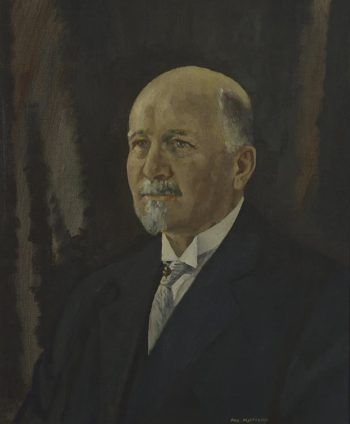Hon. W.R. Motherwell
- Canadian Agricultural Hall of Fame
- Inductees
- Hon. W.R. Motherwell

- Inducted: 1962
- Residing Province: Saskatchewan
- Gallery Location: 59
- Nominated By: Regina and Saskatoon Industrial and Agricultural Exhibition Associations,Saskatchewan Wheat Pool
Hon. W.R. Motherwell
- (1860
- -
- 1943)
A pioneer in the development of western Canada, who later became the agricultural leader of the entire country.
At the age of 22, William Motherwell, a native of Lanark County, Ontario, heeded the call of the west. On that journey he travelled from Brandon, Manitoba, to the homestead on which he settled at Abernethy, Saskatchewan, by ox cart. Upon arrival there he began to participate in community affairs by helping to organize the local school board and the Presbyterian church. In 1901 he was involved in organizing the Territorial Grain Growers’ Association and became its first president the following year.
When Saskatchewan became a province in 1905, he was invited to become the Minister of Agriculture. During his tenure of office, which covered 14 years, he was instrumental in having an agricultural faculty established at the university.
From 1921-29, he served as Canada’s Minister of Agriculture and, in that capacity, played an important role in the establishment of a cereal breeding and rust research laboratory at Winnipeg; the adoption of grade standards for most farm products; and the introduction of the restricted area plan for the eradication of tuberculosis.
Un pionnier dans le développement de l’Ouest canadien, W.R. Motherwell est devenu plus tard un leader agricole pour l’ensemble du pays.
À l’âge de 22 ans, William Motherwell, originaire du comté de Lanark, en Ontario, a répondu à l’appel de l’Ouest canadien. Durant ce périple, il a voyagé en charrette à bœufs de Brandon, au Manitoba jusqu’à la ferme sur laquelle il s’est établi à Abernethy, en Saskatchewan. Dès son arrivée, il a commencé à participer aux affaires sur le plan communautaire en aidant à organiser la commission scolaire et une paroisse presbytérienne. En 1901, il s’est impliqué dans la mise en œuvre de la Territorial Grain Growers’ Association et est devenu le premier président l’année suivante.
Lorsque la Saskatchewan est devenue une province en 1905, on l’invita à assumer le mandat de ministre de l’Agriculture. Durant son mandat de 14 ans, il a été l’instigateur de l’établissement d’une faculté agricole à l’université.
De 1921 à 1929, il a été Ministre fédéral de l’Agriculture, et à ce titre, a joué un rôle important dans l’amélioration génétique des céréales et un laboratoire de recherche sur la rouille à Winnipeg; pour l’adoption de normes de qualité pour la plupart des produits agricoles; et par l’introduction du plan de zone réglementée pour l’éradication de la tuberculose.


